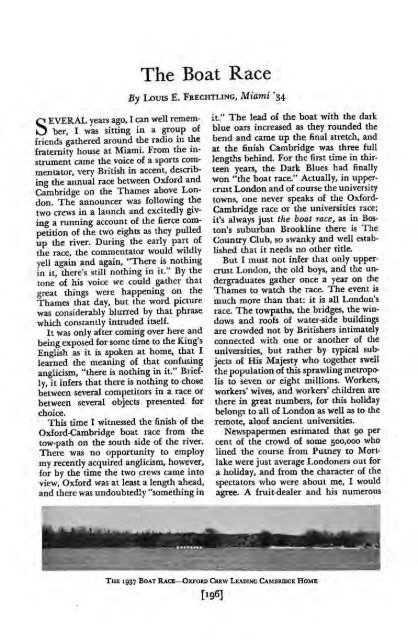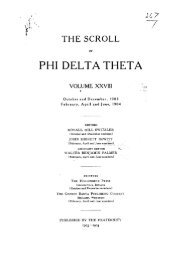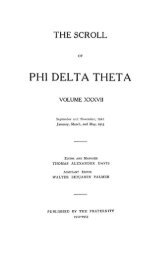1937–38 Volume 62 No 1–5 - Phi Delta Theta Scroll Archive
1937–38 Volume 62 No 1–5 - Phi Delta Theta Scroll Archive
1937–38 Volume 62 No 1–5 - Phi Delta Theta Scroll Archive
Create successful ePaper yourself
Turn your PDF publications into a flip-book with our unique Google optimized e-Paper software.
SEVERAL years ago, I can well remember,<br />
I was sitting in a group of<br />
friends gathered around the radio in the<br />
fratemity house at Miami. From the instrument<br />
came the voice of a sports commentator,<br />
very British in accent, describing<br />
the annual race between Oxford and<br />
Cambridge on the Thames above London.<br />
The announcer was following the<br />
two crews in a launch and excitedly giving<br />
a running account of the fierce competition<br />
of the two eights as they pulled<br />
up the river. During the early part of<br />
the race, the commentator would wildly<br />
yell again and again, "There is nothing<br />
in it, there's still nothing in it." By the<br />
tone of his voice we could gather that<br />
great things were happening on the<br />
Thames that day, but the word picture<br />
was considerably blurred by that phrase<br />
which constantly intruded itself.<br />
The Boat Race<br />
It was only after coming over here and<br />
being exposed for some time to the King's<br />
English as it is spoken at home, that I<br />
learned the meaning of that confusing<br />
anglicism, "there is nothing in it." Briefly,<br />
it infers that there is nothing to chose<br />
between several competitors in a race or<br />
between several objects presented for<br />
choice.<br />
This time I witnessed the finish of the<br />
Oxford-Cambridge boat race from the<br />
tow-path on the south side of the river.<br />
There was no opportunity to employ<br />
my recently acquired anglicism, however,<br />
for by the time the two crews came into<br />
view, Oxford was at least a length ahead,<br />
and there was undoubtedly "something in<br />
By LOUIS E. FRECHTLING, Miami '34<br />
it." The lead of the boat with the dark<br />
blue oars increased as they rounded the<br />
bend and came up the final stretch, and<br />
at the finish Cambridge was three full<br />
lengths behind. For the first time in thirteen<br />
years, the Dark Blues had finally<br />
won "the boat race." Actually, in uppercrust<br />
London and of course the university<br />
towns, one never speaks of the Oxford-<br />
Cambridge race or the universities race;<br />
it's always just the boat race, as in Boston's<br />
suburban Brookline there is The<br />
Country Club, so swanky and well established<br />
that it needs no other title.<br />
But I must not infer that only uppercrust<br />
London, the old boys, and the undergraduates<br />
gather once a year on the<br />
Thames to watch the race. The event is<br />
much more than that: it is all London's<br />
race. The towpaths, the bridges, the windows<br />
and roofs of water-side buildings<br />
are crowded not by Britishers intimately<br />
connected with one or another of the<br />
universities, but rather by typical subjects<br />
of His Majesty who together swell<br />
the population of this sprawling metropolis<br />
to seven or eight millions. Workers,<br />
workers' wives, and workers' children are<br />
there in great numbers, for this holiday<br />
belongs to all of London as well as to the<br />
remote, aloof ancient universities.<br />
Newspapermen estimated that 90 per<br />
cent of the crowd of some 500,000 who<br />
lined the course from Putney to Mortlake<br />
were just average Londoners out for<br />
a holiday, and from the character of the<br />
spectators who were about me, I would<br />
agree. A fruit-dealer and his numerous<br />
THE 1937 BOAT RACE—OXFORD CREW LEADING CAMBRIDGE HOME<br />
[196]

















